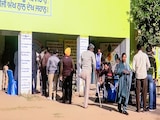People who were fully vaccinated against COVID-19 accounted for only 1 per cent of all deaths involving coronavirus in England in the first half of this year, new official figures show on Monday.
The Office for National Statistics (ONS) data shows the risk of death involving COVID is lower for people who receive two vaccinations compared to one or no dose.
Of the 51,281 deaths involving COVID in England between January 2 and July 2, 640 (1.2 per cent) were people who had received both vaccine doses -- indicating that death following full vaccination is a rare phenomenon.
"Our new analysis shows that, sadly, there have been deaths of people involving COVID-19 despite them being fully vaccinated. However, we've also found that the risk of a death involving COVID-19 is much lower among people who are fully vaccinated than those who are unvaccinated or have only received one dose,” said Julie Stanborough, deputy director of health and life events at the ONS.
"This shows the effectiveness of the vaccines in giving a high degree of protection against severe illness and death," she said.
So-called "breakthrough" deaths tend to happen in the most vulnerable, men and those with weakened immune systems, with the average age being 84. A "breakthrough death" is defined as one involving COVID-19 that occurred in someone who had received both vaccine doses, and had a first positive coronavirus test at least 14 days after the second jab.
Among those who died after two doses, 13 per cent were immunocompromised, 61 per cent were male and more than 75 per cent were clinically extremely vulnerable.
But overall numbers were very small -- they accounted for only 0.5 per cent of all deaths from COVID-19 over the first six months of the year.
(Except for the headline, this story has not been edited by NDTV staff and is published from a syndicated feed.)















